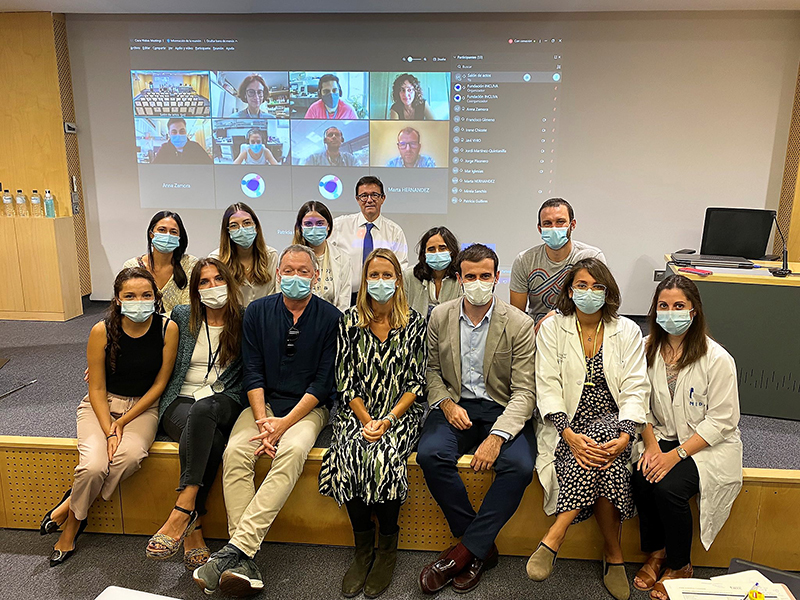
31/03/2022 - General information
The project "Tumour microenvironment-derived factors in localised colon cancer: clinical impact and therapeutic implications' (TuMiCC)"aimed at demonstrating the value of the tumour microenvironment in predicting relapse in patients with localised colon cancer treated with adjuvant therapy, has reached the 16-month development milestone, with patient recruitment and interesting advances in the molecular characterisation of this type of tumour and its environment.
The project, coordinated by Dr. Andrés Cervantes, the General and Scientific Director of the INCLIVA Health Research Institute, where he coordinates the Research Group for Innovative Diagnostic and Therapeutic Developments in Solid Tumours (INDEST), and Head of the Medical Oncology Service at Hospital Clínic de Valencia, and funded by the Spanish Association Against Cancer, aims to understand the mechanisms through which tumour cells become resistant to therapy and thus rationalise the use of chemotherapy and develop new strategies to guide treatment for patients with colorectal cancer (CRC), and avoid relapse.

Members of the research team. Source: INCLIVA
In addition to INCLIVA, the research involves the groups of Dr. Héctor García Palmer and Dr. Elena Élez, from the Vall d'Hebron Institute of Oncology (VHIO), and Dr. Clara Montagut and Dr. Alexandre Calon, from the Hospital del Mar Medical Research Institute (IMIM-Hospital del Mar) in Barcelona. TuMiCC is a multidisciplinary project that includes the collaboration of researchers such as Joan Gibert (IMIM), Jordi Badia (IMIM), Noelia Tarazona (INCLIVA), Carolina Martínez-Ciarpaglini (INCLIVA), Mar Iglesias (IMIM), and Jorge Pisionero (University of Oviedo), among others.
Colorectal cancer (CRC) -the second leading cause of cancer deaths worldwide- remains a major public health problem today, with more than one million people diagnosed each year worldwide. The prognosis of CRC patients has improved in recent decades, with 5-year survival rates reaching almost 65% in developed countries. However, up to 40% of patients relapse despite initial optimal treatment based on surgery followed by chemotherapy in high-risk cases.
Currently, pathological staging remains the most important prognostic factor and guides therapeutic decisions, but this does not predict either the therapeutic response or the final outcome in patients who have received treatment. This is a major problem, especially for stage II patients with additional risk factors and stage III, where surgery followed by adjuvant chemotherapy is the recommended treatment.
The usual treatment for localised colorectal cancer is surgery, which may or may not be followed by chemotherapy, depending on the pathological characteristics of the tumour. However, it is not known which patients are actually cured and which are not after surgery with curative intent. This results in some patients being over- or under-treated because potential biomarkers are not available to help better stratify those at high risk of relapse, who may benefit from receiving chemotherapy after surgery. It is also known that the tumour microenvironment plays a role in the relapse of these patients.
According to Dr Cervantes, "In cancer, tumour cells do play a role" but "there are also other cells, such as fibroblasts, immune system cells, and endothelial cells, apparently normal cells, that are directly involved in the development and evolution of the tumour." In this sense, he adds that "Given the significant relapse rate in patients with localised CRC, new prognostic and predictive response biomarkers are needed to better stratify patients, pinpoint mechanisms of resistance to standard therapy, and identify new therapeutic targets. The TuMiCC project is being developed to address these needs and we are convinced that achieving our objectives will impact clinical practice, resulting in a more personalised approach and the increased survival of our patients."
The project is in its second year of a total of five, and it is achieving the objectives set for this period despite the challenges posed by the pandemic. The first data is expected to be presented in the third year of the project, as the first phase has primarily entailed patient recruitment, the generation of preclinical models, and the development of relapse prediction algorithms.
Since its launch, 111 patients have been recruited for inclusion in the study; 332 tumour images from previously treated patients have been collected to test different AI-based relapse prediction models; progress has been made in the molecular characterisation of tumours and their environment; and 18 animal models (7 additional growing) as well as 33 cell cultures have been established from tumour samples. The next steps involve identifying markers to predict treatment resistance and relapse and the testing of new therapeutic solutions in established preclinical models.
TuMiCC leverages techniques that are at the forefront of cancer research. It will use promising tools like liquid biopsy, and high-throughput platforms such as massive next-generation sequencing, and it will develop preclinical models for validating the biomarkers identified and testing new drugs.
The project is supported by the Biobank, the Precision Medicine Unit and equipment acquired with ERDF funds from INCLIVA.
In 2020, the TuMiCC project obtained one of the Spanish Association Against Cancer's Grants for Coordinated Groups, the aim of which is to "promote collaborative research through multidisciplinary research groups that respond to an existing clinical need", for an amount of 992,665 euros for five years, which is how long it will last.
Servei de Comunicació:
Marta Calsina(ELIMINAR)
Tel:
(+34) 93 316 06 80
Doctor Aiguader, 88
08226 Barcelona
© Institut Hospital del Mar
d'Investigacions MèdiquesLegal Notice and Privacy Policy | Cookie Policy | Site Index | Accessibility | Find Us | Contact